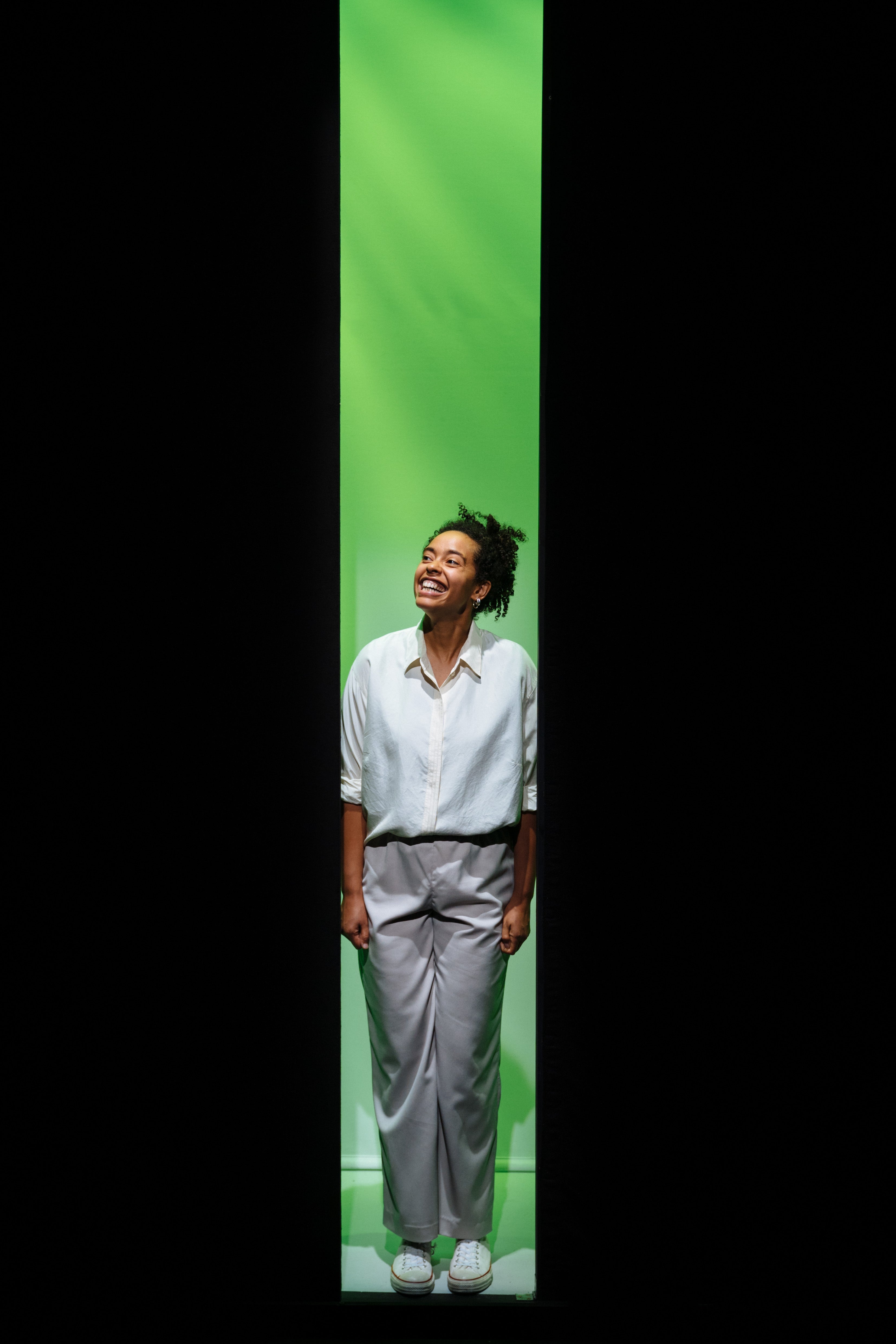Shedding a Skin’s Amanda Wilkin: ‘I worry we’ve been painted as this “woke” sector’
The one-woman show is the first play to run at Soho Theatre since the pandemic began. Its writer and star tells Ellie Harrison about embracing the kindness of strangers, a ‘distressing’ year for the industry and why the ‘ugly’ discourse around Brexit inspired her to write


The Soho Theatre is abuzz. It’s 15 months since the cutting-edge London venue has put on a play but now there’s a giddiness in the air. The dress rehearsal of the drama that’s reopening the playhouse this summer is about to begin. The tech team fan themselves in the heat. I hear a staff member whisper: “At last, we’ve got a play on.” The lights go down. The room falls quiet. And inside a neon-green strip, standing centre-stage, daring you to look away, is Amanda Wilkin.
Television audiences might recognise Wilkin from her recent role as Leanne, a member of the bereavement group in ITV comedy-drama Finding Alice from earlier this year, but her real home is on stage: she toured Hamlet to 188 countries with Shakespeare’s Globe between 2014 and 2016, and played Alphonso Lanier in the triple Olivier-winning show Emilia by Morgan Lloyd Malcolm.
This is her first major production as a playwright, but she already counts Phoebe Waller-Bridge among her fans. “I was not prepared to be kidnapped by a play and a voice so completely,” the Fleabag creator has said.
Shedding a Skin is about a woman who snaps after trying not to take up too much space for too long, squeezing herself into the box society has allocated her. Written and performed by Wilkin, the solo show is an astute, giant-hearted meditation on the human condition, warts and all. It follows Myah, a thirty-something Londoner who has just lost her job and her boyfriend. She moves in with Mildred, an elderly Jamaican woman. The pair help each other in ways they never expected.
Understandably, Wilkin is feeling the pressure. “It’s a head thing,” she tells me, sitting in the sun outside the theatre’s bar. “Knowing I’m performing to people who will be masked. Knowing the story I’m telling might be the first thing people are coming to watch. The weight you carry. The PRESSURE. You don’t want anyone to come and say, ‘Oh, good riddance to all theatre and live storytelling.’ Oh man.”
Wilkin is one of life’s great gesticulators. Wearing a green playsuit, round glasses, silver hoops and petrol-blue nail varnish, she punctuates her sentences with raised open palms, air grabs and shaking wrists. At numerous points in our conversation, her hands shoot to her mouth to contain her overflowing excitement. It’s hard not to beam in her presence.
She has missed the theatre. “I kind of feel sad and weird thinking about it,” she says. “I love watching it. I love how you can hear and see stories from people and places you never even imagined before. I love the liveness of it. I love that it allows you to reach a part of yourself, that it can hit you in a way that no other media can. I love the communal nature of it. I love the moment when the lights go down. It’s incredible.”
Wilkin describes the past year as a “really confusing and sad and distressing time”, and is disappointed, to put it mildly, with the government’s lack of support for the arts. “We weren’t sure how much support we were going to get,” she says. “We were looking at other governments who were giving much more funding. The arts benefits everyone in the education system, whether kids want to go into the arts or not. It can open people up. It’s integral to society. And I have friends who haven’t worked the entire year. And those of us who would moonlight in other jobs in the service industry when we weren’t acting or writing couldn’t do that either.”

She says that even complaining about it has come with its downfalls. “I worry we’ve been painted with this liberal leftie view, as this kind of ‘woke’ sector, just up in arms at everything when actually the arts is full of some of the most compassionate people I know. Our levels of empathy are huge.”
Although it’s been a tough year, Wilkin has a lot to be happy about. In the middle of the pandemic, she won the Verity Bargate Award for Shedding a Skin, a prize previously given to Bonnie Greer, and to Vicky Jones (who directed the original Fleabag play). “To be celebrating something so beautiful in a year that’s been so painful for a lot of reasons for everyone just feels kind of weird,” she says.
One of the judges on the award panel, TV producer Stephen Garrett, said Wilkin has “captured a generation” with her play. “That’s very kind and lovely,” she says, shaking her head in disbelief when I repeat it back to her. “That’s lovely. It is really lovely. I don’t know how to respond. My eyes popped out of their sockets when I saw all the lovely things people had to say.” That’s four lovelies. And how did she feel about Waller-Bridge’s comments? “It’s just f***ing lovely,” she says, hooting with maniacal laughter as people at other tables turn their heads to look at the commotion. “It’s a lot.”

Performing a one-woman play, says Wilkin, is “weird after a year of not speaking much”. The show opens with Myah standing awkwardly inside a vertical shaft of light. She’s wearing cream office-wear and telling the audience about a day at work that went catastrophically wrong. Her shoulders are hunched inwards. She would naturally stand at 6ft but here she is crouching slightly. Embarrassed to fill the space. “The set mirrors this feeling of constriction,” says Wilkin. “There are certain compartments to it. It’s very physical and can be moved physically as well… it opens out as Myah becomes more comfortable with her surroundings and in herself.”
Shedding a Skin is very funny, with Wilkin breaking off mid-flow to do wide-eyed ‘I mean, what the f***?’ faces to the audience as she tells Myah’s story, from workplace racism to first dates. The script is fantastic. “I feel like a dumb-ass gentrifier,” she exclaims at one point, “which feels wrong because can I even be that if I’m brown and skint?!”
Wilkin wrote the play, which deals with themes of Blackness, cultural heritage and racism, in 2018 and 2019. “I wrote this piece because it feels like we’re in a time, specifically in this country, and in the world, where we are constantly asking ourselves, ‘What does it mean to be British?’ because of Brexit,” she says. “Who gets to take up space here and who doesn’t? There was a lot of chat about the DNA of Britain, the colour of Britain. You know what it’s like, some of the discourse is just really ugly. I just wanted to embrace the fact that, as human beings, we can be kind to each other and connect to people we don’t even know, that don’t even look like us.”
Wilkin says she wants people to come away from the play with their “hearts full”. Her hands gesticulating wildly, she continues: “I want people to feel connected to people they don’t know. I want people to feel that the small acts that they do have huge repercussions somewhere else and I want people to feel joy and hope in a world that feels so full of turmoil and sadness.”
‘Shedding a Skin’ is on at Soho Theatre until 17 July. There will be a livestreamed performance of the show on 15 July



Join our commenting forum
Join thought-provoking conversations, follow other Independent readers and see their replies
Comments